[Editor’s Note: Sohrab Ahmari is the op-ed editor of the New York Post, a columnist for First Things, and a contributing editor of the Catholic Herald. Previously, he served as a columnist and editor with the Wall Street Journal opinion pages in New York and London, and as senior writer at Commentary. In addition to those publications, his writing has appeared in The New York Times, The Times Literary Supplement, The Chronicle of Higher Education, The Spectator, Dissent, and America. He spoke to Charles Camosy about his new book, The Unbroken Thread: Discovering the Wisdom of Tradition in an Age of Chaos.]
Camosy: Your introduction emphasizes Rabbi Joseph Soloveitchik’s claim that the message of tradition runs counter to “the fundamental credo of a utilitarian society.” This seems like a central idea of the book. Could you say more about it?
Ahmari: You’re absolutely right. Although the book has a vast sweep, spanning thinkers as diverse as Augustine and Andrea Dworkin, Seneca and Abraham Joshua Heschel, each of the book’s chapters ultimately returns to the idea that living within traditional limits liberates us, while the quixotic dream of liberty without ends or limits paradoxically imprisons us. That was what the Rabbi Soloveitchik was getting at: Tradition, he said, is in a sense about “retreat,” even “accepting defeat.” Sabbath restrictions, for example, urge us to set aside one day for not working, not conquering. Under a certain aspect, that looks like retreat or defeat. That’s certainly the case from the point of view of the utilitarian society, which our Holy Father, Pope Francis, has repeatedly denounced, as well.

The Rav’s point (and my argument throughout this book) is that these apparent retreats in fact allow us to live more humanely and more freely. This is the “wisdom” referred to in the subtitle — the wisdom I hope to transmit to my son and, hopefully, the reader.
It is fashionable to affirm spirituality over religiosity. Doing this is so prevalent, in fact, that it is rather a boring thing to do. But one of your chapters asks the provocative question, “Can you be spiritual without being religious?” Readers need to get your book for the full answer, but what’s the short version?
The short answer is that the problem with being “spiritual but not religious” is that it fails as spirituality. People who identify that way — 1 in 5 Americans, according to recent polling — still do all sorts of “religious” or ritualistic things (Dead Sea baths, “mindfulness,” etc.), only without the shared, public accounts of ultimate meaning that truly make religious spirituality beneficial to individuals and communities.
You name Christianity as, “A Religion of the Poor” in one of your section headings. This obviously means something essential in how we should form our hearts and religious communities. But you also believe that it means something for how we should form our public policies as well. Could you give some examples?
Yes, that chapter is based on the life and thought of the great 20th-century African-American pastor, mystic and intellectual Howard Thurman, whose ideas guided Dr. King’s civil-rights activism in the 1960s. And what he meant is that the Christian faith’s message can’t just be one of moral exhortation without paying attention to men and women’s material conditions.
I wrote that chapter thinking especially of a certain kind of “social conservative,” who laments declining marriage, childbearing and church-attendance rates, but who pays no attention to how, for example, economic and labor-market conditions make it hard for working- and middle-class Americans of all races to develop stability in the virtues and to have the solidity needed to make great acts of sacrifice (like getting and staying married and starting families).
Though I don’t mention him explicitly in the chapter, the spirit of the French Jesuit and Vatican II peritus Jean Cardinal Danielou also hovers in the background of my argument. Like Thurman, Danielou insisted that Christianity was a “religion of the poor.” Yes, Jesus of Nazareth addressed himself to a spiritual elite (most of whom let him down when it really mattered!) — but he also spoke to the joys and anxieties of the ordinary masses: The wedding at Cana, the feeding of the 5,000, etc., our Lord’s love for children, all these scenes show Jesus’ solicitude for the “poor,” understood broadly to mean the masses.
Bearing these gospel facts in mind, Danielou argued, we must admit that Christianity only became “fully itself” after the Constantinian conversion, when the faith become a legal religion, and later the official religion of the Roman Empire. Henceforth, the faith wasn’t just for a spiritual or ascetic elite, who could withstand any pagan persecution, but also for the ordinary Roman, who may not even have understood every article of the Creed and whose conversion may even have been half-hearted, a matter of political conformity in his community. Nevertheless, he now benefited from a more humane social order and objectively efficacious Christian sacraments. By encompassing a whole civilization (Rome), the Church could now attend to the spiritual wellbeing of the ordinary man or woman, even if his or her faith was little more than external ritual.
I’m digressing a bit, and this is a provocative argument, but the point for Christians is this: We today must also seek this kind of civilizational “encompassing.” We shouldn’t just exhort the poor to faith and morals, but work to change the material conditions that suffocate the faith of the weak and the poor, be it eye-watering economic inequalities or the pornographization of daily life.
This is interesting given that, I think, you identify as a conservative. These ideas about public policy are quite different from those of the conservatism I knew when I first started becoming aware of politics in the 1980s and 1990s. Does this signal something new happening in the conservative movement?
The old conservatism still chugs along, discredited, boring and unresponsive to today’s crisis — yet still cash-flush, thanks to corporations that benefit from its message. But all the youthful energy on the right, as far as I can see, is with various strands of conservatism that emphasize the common good, that see how liberty without limits has paradoxically destroyed our true liberty; more young conservatives than some may imagine reject the entire premise that politics can be severed from the quest from the highest good or ultimate end of human life. It’s an exciting moment on the right!
Again, when I first started becoming aware of politics it was the left which was decrying religious traditionalists for trying to impose their views onto others by means of the state. But one would think that you’d get libertarian-leaning folks on the right decrying your attempts to impose your traditional religiosity via these policies. Has that happened?
Oh, I sometimes get much harder and more vicious pushback from the libertarian or classically liberal right than I do from the left. In fact, I’m finding allies among what might be called the old, class-based, economic left.
Why did you conclude the book with a letter to your son?
I never thought about the concept of posterity until my wife and I had our first child, Maximilian, for whom I wrote this book. Then, suddenly, I was gripped by anxiety about fatherhood, about how I was forming my son and how I was failing to do so, and about how our degraded culture would form him — or rather, de-form him. And without sounding morbid, I began to give serious thought to my own death. This was all before the novel coronavirus reached our shores and began to wreak havoc on our society. I finished the first draft of this book at the very height of pandemic, when death was so thick in the air. And that made my dual mission — as a father and an author — all that more urgent. I wrote that concluding letter at a time when COVID hospitalizations and deaths were peaking, and lockdowns were leaving millions jobless and isolated. And I think those realities lend the text a raw kind of power: In that grim moment, I felt I had to put to paper my best advice to my then 3-year-old son.
















